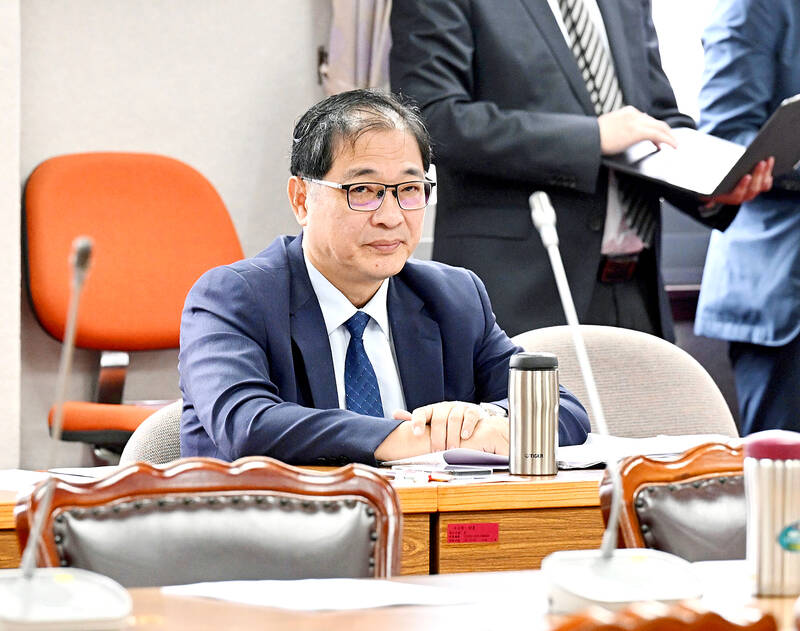The Ministry of Justice is considering increasing penalties for child abuse, including eliminating the potential of parole for cases resulting in the deaths of children younger than seven years old, Minister of Justice Cheng Ming-chien (鄭銘謙) said yesterday.
Cheng was responding to questions from legislators about increasing penalties for child abuse, after two sisters were sentenced last month for causing the death of a one-year-old boy nicknamed Kai Kai (剴剴).
The Legislative Yuan’s Judiciary and Organic Laws and Statutes Committee invited officials from the ministry and the Judicial Yuan to report on the factors that influence sentencing guidelines involving the death penalty.

Photo: Lo Pei-de, Taipei Times
The factors include statements from the victims or relatives, the possibility of rehabilitation, as well as 10 items under Article 57 of the Criminal Code that sentencing can take into account, such as motive, education level and the offender’s attitude after the crime.
Lawmakers cited the Kai Kai case as a reason to increase child abuse penalties, after an online petition received thousands of signatures.
The ministry on Tuesday met with a criminal law research team and is to hold another consultation today, soliciting opinions from all sectors, Cheng said.
Any proposed amendments would increase penalties, he added.
The ministry has a zero tolerance view on child abuse, and would revise the law with that principle in mind, he said.
The ministry is also considering eliminating the possibility of parole for those convicted of abuse of children younger than seven that resulted in the child’s death, he added.
The matter touches on constitutional powers and previous judgements, Judicial Yuan Deputy Secretary-General Wang Mei-ying (王梅英) said, adding that the Judicial Yuan respects the rulings of the Constitutional Court.
Although there was bipartisan support for increasing penalties, legislators failed to reach a consensus on proposed amendments.
Chinese Nationalist Party (KMT) lawmakers previously proposed amendments to articles 271 and 286 of the Criminal Code, increasing the penalty for child abuse resulting in death to the death penalty.
Article 271 says that a person who takes the life of another shall be sentenced to death, life imprisonment or no less than 10 years in prison. Article 286 allows life imprisonment for abuse causing death.
KMT Legislator Wang Hung-wei (王鴻薇) said she hoped the ministry would propose amendments to protect children and use capital punishment to achieve equitable justice.
Everyone wants to protect children, but the legal principles behind amending the law must be clarified, Democratic Progressive Party (DPP) Legislator Chuang Jui-hsiung (莊瑞雄) said.
To amend the law after three or six months “would be too long,” DPP caucus chief executive Rosalia Wu (吳思瑤) said, adding that she hoped the parties could reach a consensus soon.
The ministry is not opposed to amending either article, Deputy Minister of Justice Huang Mou-hsin (黃謀信) said, adding that it would submit legal opinions on amendments within one month for members of the committee.
Lawmakers agreed to defer further discussions for cross-party discussions.

Right-wing political scientist Laura Fernandez on Sunday won Costa Rica’s presidential election by a landslide, after promising to crack down on rising violence linked to the cocaine trade. Fernandez’s nearest rival, economist Alvaro Ramos, conceded defeat as results showed the ruling party far exceeding the threshold of 40 percent needed to avoid a runoff. With 94 percent of polling stations counted, the political heir of outgoing Costa Rican President Rodrigo Chaves had captured 48.3 percent of the vote compared with Ramos’ 33.4 percent, the Supreme Electoral Tribunal said. As soon as the first results were announced, members of Fernandez’s Sovereign People’s Party

MORE RESPONSIBILITY: Draftees would be expected to fight alongside professional soldiers, likely requiring the transformation of some training brigades into combat units The armed forces are to start incorporating new conscripts into combined arms brigades this year to enhance combat readiness, the Executive Yuan’s latest policy report said. The new policy would affect Taiwanese men entering the military for their compulsory service, which was extended to one year under reforms by then-president Tsai Ing-wen (蔡英文) in 2022. The conscripts would be trained to operate machine guns, uncrewed aerial vehicles, anti-tank guided missile launchers and Stinger air defense systems, the report said, adding that the basic training would be lengthened to eight weeks. After basic training, conscripts would be sorted into infantry battalions that would take

GROWING AMBITIONS: The scale and tempo of the operations show that the Strait has become the core theater for China to expand its security interests, the report said Chinese military aircraft incursions around Taiwan have surged nearly 15-fold over the past five years, according to a report released yesterday by the Democratic Progressive Party’s (DPP) Department of China Affairs. Sorties in the Taiwan Strait were previously irregular, totaling 380 in 2020, but have since evolved into routine operations, the report showed. “This demonstrates that the Taiwan Strait has become both the starting point and testing ground for Beijing’s expansionist ambitions,” it said. Driven by military expansionism, China is systematically pursuing actions aimed at altering the regional “status quo,” the department said, adding that Taiwan represents the most critical link in China’s

‘REALLY PROUD’: Nvidia would not be possible without Taiwan, Huang said, adding that TSMC would be increasing its capacity by 100 percent Nvidia Corp CEO Jensen Huang (黃仁勳) on Saturday praised and lightly cajoled his major Taiwanese suppliers to produce more to help power strong demand for artificial intelligence (AI), capping a visit to the country of his birth, where he has been mobbed by adoring fans at every step. Speaking at an impromptu press conference in the rain outside a Taipei restaurant, where he had hosted suppliers for a “trillion-dollar dinner,” named after the market capitalization of those firms attending, Huang said this would be another good year for business. “TSMC needs to work very hard this year because I need a lot